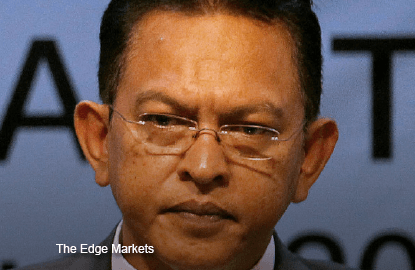
SHAH ALAM: Proton Holdings Bhd’s sports car subsidiary, Lotus Group International Ltd, plans to build a plant to manufacture Lotus-brand sport utility vehicles (SUVs) in Fujian Province, China, by 2019.
The proposed plant will have an initial capacity to produce 100,000 SUVs per year.
Proton chief executive officer Datuk Abdul Harith Abdullah said the move is in line with Lotus Group’s plan to manufacture its first SUV in China, in 2019.
“We are talking to the local authorities [in China] to build a manufacturing plant there. But before we can do that, it will take us at least two years to obtain a manufacturing licence,” Abdul Harith, who is also a director of Lotus Group, told DigitalEdge Daily.
“Once we get the licence, we, together with our local partner (Goldstar Heavy Industrial Co Ltd), will start building the manufacturing facility,” he said.
Proton and Lotus Group in April this year signed a joint-venture (JV) agreement with China’s Goldstar, which will see a Lotus-brand passenger car built and sold in the country, as well as aftersales services of Lotus cars provided there. Lotus Group has identified China as the company’s top key growth market for exports, and expects it to expand even faster in the coming years.
This will be done via a JV, Goldstar Lotus Automobile Co Ltd, in which Proton, Lotus Group and Goldstar will hold stakes of 40%, 10% and 50%, respectively. The investment in China is expected to cost up to 10 billion yuan (RM6.16 billion).
“China currently contributes 20% or 22 million cars of global automotive sales, and it is important for us to have a presence there,” said Abdul Harith.
“We will start with Lotus [SUVs] first, and gradually, we will bring Proton [models] there. But first, we need to understand China’s auto policy, which requires China’s cars to have high levels of local content.
“That’s because we could get penalised if we don’t comply with it (policy), which could lead to our cars becoming expensive and less competitive,” he added.
During the first year of operations, Abdul Harith projects Lotus Group to sell more than 10,000 SUVs in China, and subsequently increased to match its production capacity. In the long run, he did not discount the possibility of exporting the SUVs out of China to other markets in Europe, Asia and the United States.
“We view Lotus as a premium brand. Obviously, we want to be at par with competitors, and in this case, we see premium brands, such as Audi, Porsche and even Lamborghini, having the SUV segment,” he said.
Abdul Harith declined to reveal the SUV’s specifications, saying it is still in the early design stage.
It is understood that the Lotus SUV will rival Porsche’s Macan models, and will have engine capacities from two litres.
Meanwhile, Abdul Harith said Lotus Group recently completed the rightsizing of its engineering arm, which saw its overall workforce reduced by 25%, as it seeks to achieve lean and competitive operations amid a high-cost base.
For the financial year ended March 31, 2014 (FY14), Lotus Group trimmed its employee and pension cost by 9% to £48.66 million from £53.44 million in FY13.
“We took a painful decision to downsize Lotus Group’s operations, mainly because we wanted to achieve higher efficiency. The engineering arm is still there, but a rightsizing was needed to save overhead costs substantially in the future,” said Abdul Harith.
Currently, Lotus Group’s engineering arm provides consultancy services — particularly for suspension systems — to other car manufacturers.
For FY14, Lotus Group’s engineering arm saw its revenue fall 42% to £12.63 million from £21.97 million for the previous year, as it grappled with weak market condition, increased competition and cost pressures. The weak performance of the engineering arm pulled the group’s revenue for FY14 down by 9% to £81.12 million from £89.76 million for FY13.
“We are streamlining Lotus Group’s engineering unit to grow its third-party consultancy business, while continuing to support the in-house product development,” he said.
Abdul Harith expects Lotus Group to sell some 3,000 cars in FY16, from 2,015 units recorded in FY15, anchored by its existing Elise, Exige and Evora models, as well as additional variants to be launched later in the year. Sales of Lotus cars have been improving from 1,292 units in FY13 to 1,301 units in FY14.
Abdul Harith also believes that some 50 new dealers spread across Europe, the Middle East and Asia — who will join Lotus Group by year end — will help to boost sales.
“The positive reception that we have been receiving in both new and established markets is telling signs that our product development strategy is heading in the right direction. We are constantly enhancing our distribution channel as demand for Lotus cars in countries like China and Japan continues to grow.
“The new models and variants recently launched will hopefully accelerate sales volumes in the United States, Europe, the Middle East and Asia by considerable margins,” said Abdul Harith.
This year, Abdul Harith expects Lotus Group to have a positive operating cash flow, with an aim to break even in FY16.
For FY14, Lotus Group saw its net loss narrowed to £71.07 million from £167.85 million for 2013, while operating loss eased to £44.7 million from £60.3 million a year ago. Sales of Lotus cars grew by a marginal 1% to £68.49 million for FY14, from £67.79 million for FY13, driven by its Exige model and motor sport derivatives.
Lotus Group currently has zero borrowing as all of its debt, which amounted to £203.81 million (RM1.22 billion), was settled by Proton last year.
“This removes the burden of Lotus Group, and we will continue to support Lotus Group in its quest create value for its stakeholders. You have to understand that the substantial investment is needed to implement the strategies, and returns will bear fruit in the long run,” said Abdul Harith.
This article first appeared in Digital Edge Daily, on August 3, 2015.